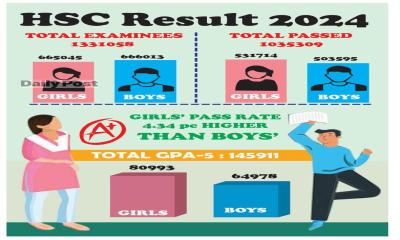- More than 2 lakh cancer patients in country
-Men have a higher rate of laryngeal cancer
- 73.5 Pc of men with cancer are smokers
-61.5 Pc of women affected by unwashed tobacco
114 deaths per lakh people in the country are affected by cancer. According to the population, there are currently two lakh cancer patients in the country. However, due to the lack of population-based cancer registries, there are limitations in knowing the exact situation of cancer in Bangladesh. This information came out in a seminar organized in the conference hall of Bangabandhu Sheikh Mujibur Rahman Medical University (BSMMU) Super Specialized Hospital on Tuesday.
This seminar was organized for the first time to publish population-based cancer registry data to inform Bangladesh cancer situation. Dr Md Khalekuzzaman, associate professor of public health and informatics department of the university and chief researcher of the related subject, said in the seminar, "In this study conducted from July 1, 2023 to June 30, 2024, Internet-based specially developed cancer registry software has been used. Research data was collected by visiting each house and conducting interviews. A total of 1 lakh 16 thousand 4 hundred 75 people living in 27 thousand 787 houses have been included in the registry. Among them, the number of cancer patients registered is 133. As a rate, it is 114 people per lakh.
According to the current population of Bangladesh, the number of cancer patients in the country is more than two lakh. He said that the study was conducted in Pumdi, Shahedal, Araibaria and Gobindpur Unions of Hossainpur Upazila of Kishoreganj. The speakers in the seminar emphasized on raising awareness of cancer prevention, bringing cancer diagnosis centers under a network, continuing activities related to cancer, maintaining proper registry of patients, increasing treatment facilities. They said population-based cancer registries have opened many research doors. It was informed in the seminar that cancer is one of the major causes of death in the present world.
In the Globocan report, the number of cancer patients in Bangladesh in 2022 was 1 lakh 67 thousand 256 and the number of deaths was 1 lakh 16 thousand 598, but there are limitations in knowing the exact situation of cancer in Bangladesh due to the lack of population-based cancer registry. According to the results of the research, a total of 16,475 people living in 27,787 houses have been included in the registry. Among them, 48.4 percent are male and 51.6 percent are female. Among those registered, the number of cancer patients is 133. The rate is 114 per lakh (120 per lakh for males and 108 per lakh for females). The highest rate of cancer patients was found among women (16.5 percent) and men (18.0 percent) aged 51 to 60 years. Laryngeal cancer rates are highest in men (13.2 percent).
The other top cancers in terms of prevalence are stomach (10.2 percent), lip and oral cavity (8.8 percent), lung (7.4 percent) and esophagus (7.4 percent) cancers. Breast cancer rates are highest among women (35.4 percent). Top others include cancers of the cervix (12.3 percent), lips and oral cavity (10.8 percent), thyroid (7.4 percent), and ovarian (4.6 percent). Among cancer patients, 28.6 percent had high blood pressure, 11.3 percent had diabetes, 8.3 percent had heart disease, and 3 percent had kidney complications and stroke. 73.5 percent of men with cancer had a history of regular smoking, 41.2 percent of men and 61.5 percent of women used smokeless tobacco, and 64.7 percent of men and 75.4 percent of women had a history of regular betel nut consumption.
In addition, 13 percent of cancer patients received only chemotherapy, 11.3 percent only surgery, 2.3 percent only radiotherapy, 9.7 percent only palliative care, and 59.5 percent received more than one of the aforementioned services. 4.5 percent of registered cancer patients did not receive any treatment. According to the seminar, policies can be developed to deal with cancer in Bangladesh based on the situation of cancer, co-morbidities, cancer treatment methods and existing risk factors of cancer. By ensuring the necessary allocation, health care facilities, especially upazila health complexes, can be equipped with appropriate diagnostic, treatment and palliative services to provide the best possible support to cancer patients.
Strengthening cancer services at all levels of healthcare will benefit cancer patients financially as well as getting proper treatment. As a recommendation, necessary initiatives should be taken to keep this population-based cancer registry active. Upazila Health Complex should ensure necessary services for cancer patients. Emphasis should be placed on programs to increase awareness about cancer risk factors. Researchers should be encouraged to conduct future cancer research using this registry.
ZH






